African Studies
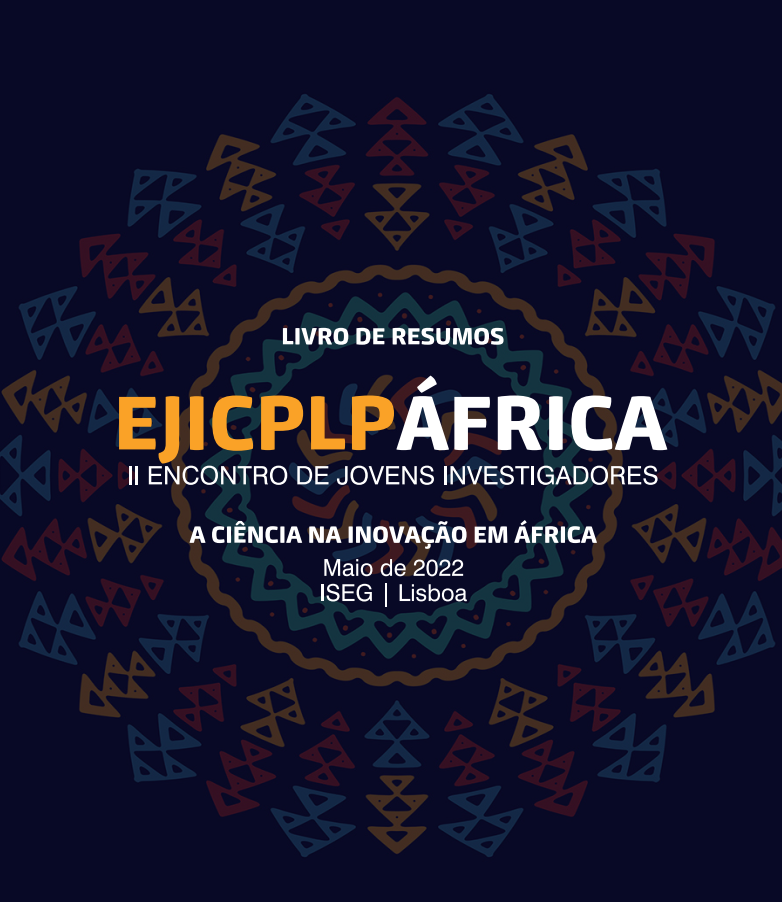
Ebook – EJICPLP Africa: Science in Innovation in Africa
Abstract:
The Meeting of Young Researchers from CPLP on Africa is an inclusive space for debate and scientific dissemination in African studies and in Portuguese language, in an innovative, democratic and multicultural perspective. The success of this project began in 2021, when it was proposed to bring participation and protagonism to young people, as agents of change in a living community in permanent transformation. In this context, the 2nd Meeting was held in May 2022, in Lisbon, where the role of science in innovation in Africa was discussed, exceeding all expectations, whether in the quality of the debates, the excellence and diversity of the works presented, or the massive adhesion of the participants. The Meeting took place thanks to the work carried out by the Organising Committee, an International Scientific Council, with the collaboration of the Centre for African and Development Studies (CEsA), as the proponent entity. in addition to the support of other partner institutions, such as the CPLP, Lisbon City Council (CML), Higher Institute of Economics and Management (ISEG), Catholic University of Angola (UCAN), Union of Portuguese Speaking Capital Cities (UCCLA), Eduardo Mondlane University (UEM – Mozambique), Association of Municipalities for Sustainable Development of the Umbria Region (FELCOS – Italy). The 2º Encontro de Jovens Investigadores da CPLP sobre África – Livro de Resumos was only possible thanks to the collaboration of numerous people, in particular the Organizing Committee, the Scientific Council, the Speakers, the Institutional Partners, the Medias Partners, the Volunteers and the Scientific Community.
Quotation:
D’Abril, Cristina Molares [et al.] (2022). “2º Encontro de Jovens Investigadores da CPLP sobre África. Livro de Resumos”. ISBN: 978-989-54687-3-7
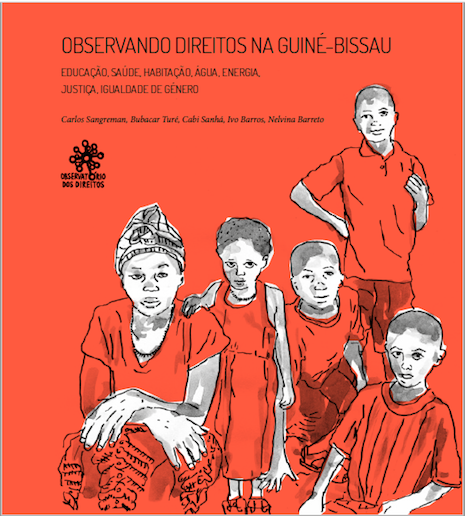
Observando direitos na Guiné-Bissau: educação, saúde, habitação, água, energia, justiça, igualdade de género
The Rights Observatory integrated in a structure such as Casa dos Direitos is an example of what civil society can do in fragile social contexts, but where power respects the Right to Opinion (even if at some times there is repression of media outlets such as radios and television and a climate of threat to critics of the situation at the time). The data collected on access to Economic and Social Human Rights, disseminated through books and exhibitions, in order to be used by activists and responsible authorities, has even been the basis for academic research at undergraduate, master’s and, this year, doctoral levels, especially in Portugal and Brazil.
Abstract:
The objective of Observando direitos na Guiné-Bissau: educação, saúde, habitação, água, energia, justiça, igualdade de género and the Observatório dos Direitos in 2019 was to continue the collection of data on access to Economic and Social Human Rights in Guinea-Bissau with data comparable to those of 2016, and to include two innovations: a new chapter on Women’s Rights or Equality of Gender and perform data collection also in the Bolama/ Bijagós region.
Quotation:
Sangreman, Carlos [et al.] (2020). Observando direitos na Guiné-Bissau : educação, saúde, habitação, água, energia, justiça, igualdade de género. Lisboa: ACEP, com LGDH e CEsA. URL: https://www.repository.utl.pt/handle/10400.5/20866
Access the article here.
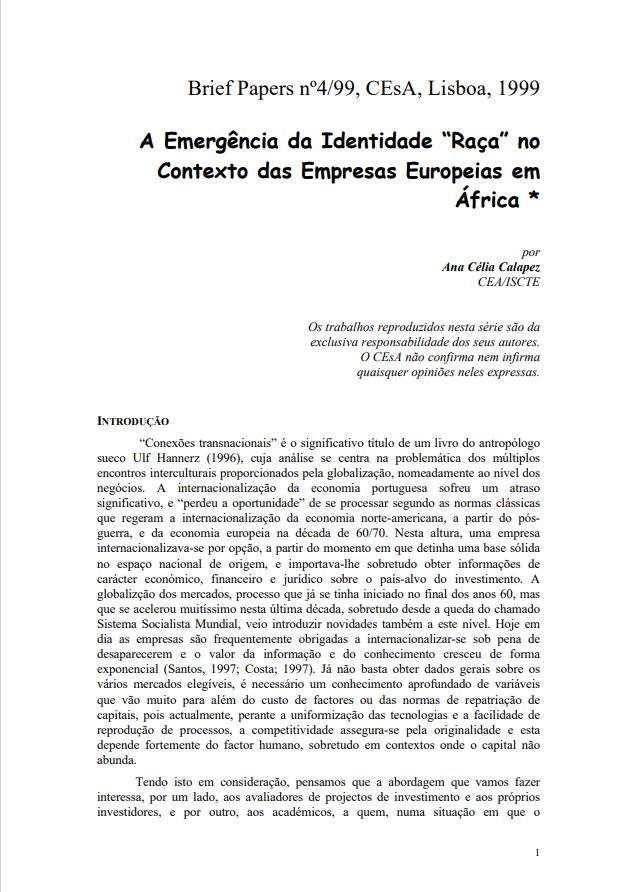
Brief Paper 4/1999: A emergência da identidade “Raça” no contexto das empresas europeias em África
Abstract:
Transnational Connections” is the significant title of a book by the Swedish anthropologist Ulf Hannerz (1996), whose analysis focuses on the problem of the multiple intercultural encounters which globalisation provides, namely at the business level. The internationalisation of the Portuguese economy suffered a significant delay and “missed the opportunity” to follow the classic rules which governed the internationalisation of the North American economy, from the post-war period, and of the European economy in the 60s and 70s. At that time, a company internationalised by choice, as soon as it had a solid base in its home country, and it was mainly important for it to obtain economic, financial and legal information on the target investment country. The globalisation of markets, a process that had already begun at the end of the 1960s, but which has greatly accelerated in the last decade, especially since the fall of the so-called World Socialist System, has also introduced innovations at this level. Nowadays, companies are often obliged to internationalise themselves or risk disappearing and the value of information and knowledge has grown exponentially (Santos, 1997; Costa; 1997). It is no longer enough to obtain general data on the various eligible markets, it is necessary to have in-depth knowledge of variables that go far beyond the cost of factors or the rules of repatriation of capital, because today, in the face of the standardisation of technologies and the ease of reproduction of processes, competitiveness is ensured by originality and this depends heavily on the human factor, especially in contexts where capital is not abundant. A emergência da identidade “Raça” no contexto das empresas europeias em África (The emergence of the “Race” identity in the context of European companies in Africa) was prepared for a paper on race at the CEsA 1999 Seminar: The problematic of development – history and current contributions from a transdisciplinary perspective, Conference on Strategic Identities for Development in Sub-Saharan Africa: gender and race, 23rd June 1999.
Quotation:
Calapez, Ana Célia. 1999. “A emergência da identidade “Raça” no contexto das empresas europeias em África”. Instituto Superior de Economia e Gestão – CEsA Brief papers nº 4-1999
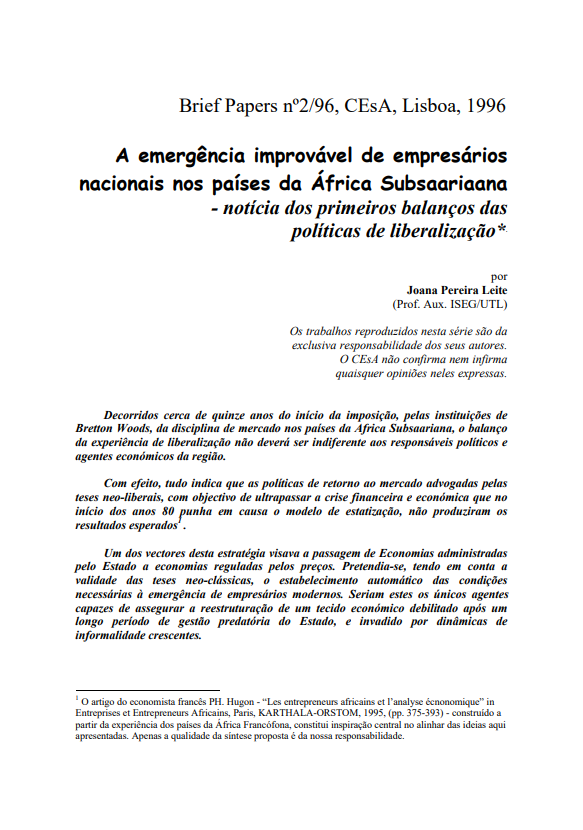
Brief Paper 2/1996: A Emergência Improvável de Empresários Nacionais nos Países da África Subsaariaana: Notícia dos primeiros balanços das políticas de liberalização
Abstract:
About fifteen years after the Bretton Woods institutions started imposing market discipline on the countries of Sub-Saharan Africa, the assessment of the liberalisation experience should not be indifferent to political leaders and economic players in the region. In fact, everything indicates that the policies of return to the market advocated by the neo-liberal theses, with the aim of overcoming the financial and economic crisis which, at the beginning of the 1980s, called the nationalisation model into question, did not produce the expected results. One of the vectors of this strategy was the transition from state-managed economies to price-regulated economies. Taking into account the validity of the neoclassical theses, the aim was the automatic establishment of the necessary conditions for the emergence of modern entrepreneurs. These would be the only agents capable of ensuring the restructuring of a weakened economic fabric after a long period of predatory management by the state, and invaded by growing dynamics of informality. A emergência improvável de empresários nacionais nos países da África Subsaariaana: notícia dos primeiros balanços das políticas de liberalização is not intended to recall the “formal/informal” debate, so dear to the economic literature of the last two decades. Bearing in mind the extreme economic complexity of African societies, the aim is simply to highlight some relevant, though not always evident, aspects of recent reflection on the difficult emergence of the African business class in the context of adjustment policies.
Quotation:
Leite, Joana Pereira. 1996. “A emergência improvável de empresários nacionais nos países da África Subsaariaana : notícia dos primeiros balanços das políticas de liberalização”. Instituto Superior de Economia e Gestão – CEsA Brief papers nº 2-1996

Brief Paper 1/1996: As Fronteiras em África: Contributo para uma reflexão crítica
Abstract:
The role played by political borders in Africa (predominantly inherited from the colonial period) has merited some critical reflections by some authors, both in terms of their role in the construction of the new states and in terms of their impact and consequences in the lives of the populations of the cross-border regions. In As fronteiras em África: contributo para uma reflexão crítica we have two texts, by Daniel Bach and Emmanuel Grégoire, from which short extracts are presented. First, however, a necessarily succinct exposition of their respective theses: For Daniel Bach, Regionalisation tends to be done not by dismantling the barriers that constitute borders, but by taking advantage of the business opportunities originated by these very borders. A second thesis of Bach is that the Structural Adjustment Programmes, by reducing fiscal or customs differences between states, tend to transfer to the external borders of the continent those same business opportunities or the search for them…) and thus accelerate the criminalisation of flows. A first question arises here: the nature of this “regionalisation” of which Daniel Bach speaks, and the text of this author which we quoted above is as follows: “Transstate flows and circuits exercise functions of social regulation and accumulation which are vital for populations faced with the disintegration of official circuits and the regression of the territorial framework of the state”. As for Grégoire, the text offered for our reflection here is taken from a historical and anthropological account of a phenomenon which at first sight is predominantly economic and has the suggestive title: “The Smuggling Paths “Far from being an obstacle to trade, the border which has separated the Hausa country for over twenty years is, on the contrary, a stimulus… On an economic level, its dynamic effects outweigh the negative effects…”.
Quotation:
Statter, Guilherme da Fonseca. 1996. “As fronteiras em África: contributo para uma reflexão crítica”. Instituto Superior de Economia e Gestão – CEsA Brief papers nº 1-1996.
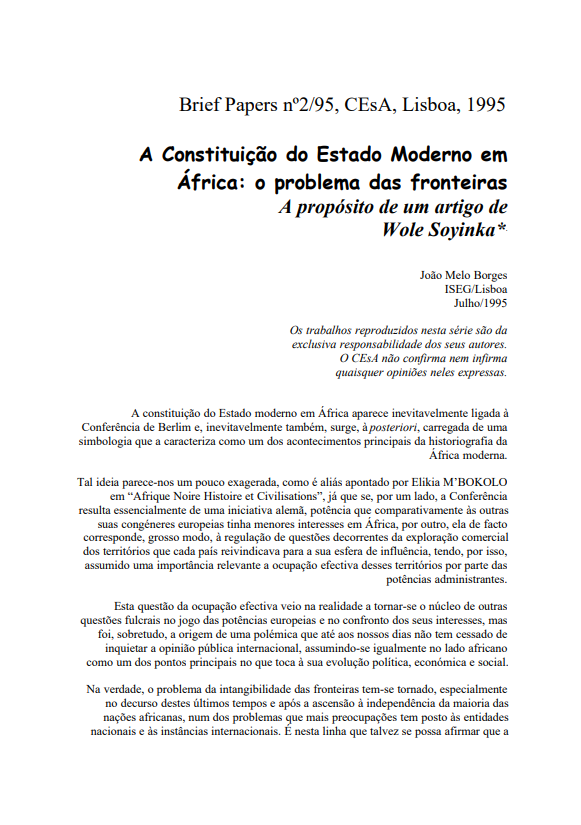
Brief Paper 2/1995: A Constituição do Estado Moderno em África: O problema das fronteiras: a propósito de um artigo de Wole Soynka
Abstract:
The constitution of the modern state in Africa is inevitably linked to the Berlin Conference and, inevitably, it is also loaded with a symbology that characterises it as one of the main events in the historiography of modern Africa. This idea seems a little exaggerated to us, as Elikia M ‘BOKOLO points out in “Afrique Noire Histoire et Civilisations”, since, if on the one hand, the Conference was essentially the result of a German initiative, a power which, compared to its European counterparts, had fewer interests in Africa, on the other, it in fact corresponded, roughly speaking, to the regulation of questions arising from the commercial exploitation of the territories that each country claimed for its sphere of influence. In fact, this question of effective occupation became the core of other questions at the heart of the game of European powers and the confrontation of their interests, but it was, above all, the origin of a polemic that has not ceased to disturb international public opinion to this day, also becoming, on the African side, one of the main points as regards its political, economic and social evolution. In fact, the problem of the intangibility of borders has become, especially in recent times and after the rise to independence of most African nations, one of the most worrying issues for national entities and international bodies. A constituição do Estado Moderno em África : o problema das fronteiras : a propósito de um artigo de Wole Soynka was elaborated within the scope of the course História de África of the Master in International Development and Cooperation taught at the ISEG/UTL, of which Prof. Joana Pereira Leite is in charge.
Quotation:
Borges, João Melo. 1995. “A constituição do Estado Moderno em África : o problema das fronteiras : a propósito de um artigo de Wole Soynka”. Instituto Superior de Economia e Gestão – CEsA Brief papers nº 2-1995
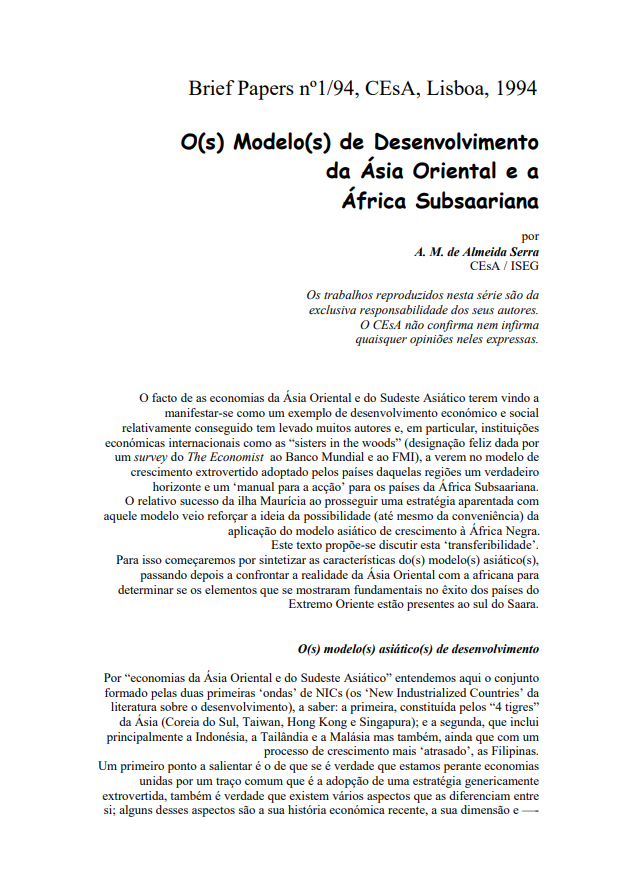
Brief Paper 1/1994: O(s) Modelo(s) de Desenvolvimento da Ásia Oriental e a África Subsaariana
Abstract:
The fact that the economies of East Asia and Southeast Asia have emerged as an example of relatively successful economic and social development has led many authors and, in particular, international economic institutions such as the “sisters in the woods” (the felicitous name given to the World Bank and the IMF by a survey in The Economist), to see the model of extroverted growth adopted by the countries of those regions as a real horizon and “manual for action” for the countries of Sub-Saharan Africa. The relative success of Mauritius in pursuing a strategy similar to this model has reinforced the idea that it is possible (and even desirable) to apply the Asian growth model to Black Africa. O(s) modelo(s) de desenvolvimento da Ásia Oriental e a África Subsaariana aims to discuss this “transferability”. To this end, we shall begin by summarising the characteristics of the Asian model(s), and then move on to confront the East Asian reality with that of Africa in order to determine whether the elements that proved fundamental to the success of the Far Eastern countries are present to the south of the Sahara.
Quotation:
Serra, António M. de Almeida. 1994. “O(s) modelo(s) de desenvolvimento da Ásia Oriental e a África Subsaariana”. Instituto Superior de Economia e Gestão – CEsA Brief papers nº 1-1994.
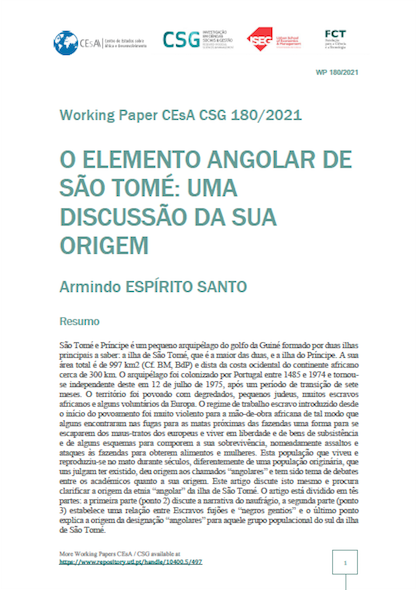
Working Paper 180/2021: O Elemento Angolar de São Tomé: Uma discussão da sua origem
Abstract:
São Tomé and Príncipe is a small archipelago in the Gulf of Guinea formed by two main islands, namely: the island of São Tomé, which is the larger of the two, and the island of Príncipe. Its total area is 997 km2 (Cf. BM, BdP) and is approximately 300 km from the west coast of the African continent. The archipelago was colonized by Portugal between 1485 and 1974 and became independent on July 12, 1975, after a seven-month transition period. The territory was populated with exiles, small Jews, many African slaves and some volunteers from Europe. The slave labor regime introduced since the beginning of the settlement was very violent for the African labor in such a way that some found in the escapes to the forests close to the farms a way to escape the mistreatment of the Europeans and live in freedom and subsistence goods and some schemes to compose their survival, namely assaults and attacks on farms to obtain food and women. This population that lived and reproduced in the bush for centuries, unlike an original population, which some believe to have existed, gave rise to the so-called “Angolas” and has been the subject of debates among academics as to its origin. This article discusses this and seeks to clarify the origin of the “Angolar” ethnic group on the island of São Tomé. O Elemento Angolar de São Tomé: Uma discussão da sua origem is divided into three parts: the first part (point 2) discusses the narrative of the shipwreck, the second part (point 3) establishes a relationship between fugitive slaves and “Black Gentiles” and the last point explains the origin of the designation “Angolas ” for that population group in the south of the island of São Tomé.
Quotation:
Santo, Armindo Espírito (2021). “O elemento angolar de São Tomé: uma discussão da sua origem”. Instituto Superior de Economia e Gestão – CEsA/ CSG – Documentos de Trabalho nº 180/2021.
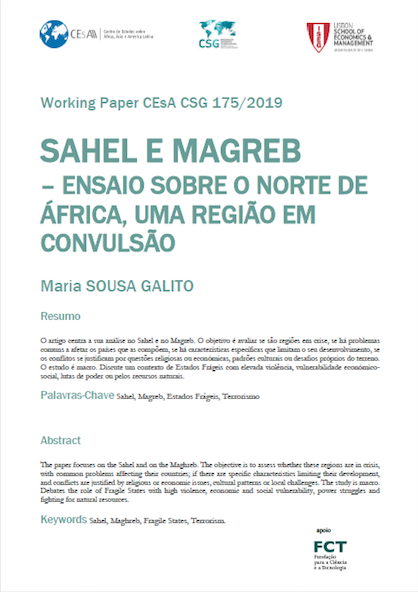
Working Paper 175/2019: Sahel e Magreb: Ensaio sobre o Norte de África, uma região em convulsão
Abstract:
Sahel e Magreb : ensaio sobre o norte de África, uma região em convulsão focuses on the Sahel and on the Maghreb. The objective is to assess whether these regions are in crisis, with common problems affecting their countries; if there are specific characteristics limiting their development, and conflicts are justified by religious or economic issues, cultural patterns or local challenges. The study is macro. Debates the role of Fragile States with high violence, economic and social vulnerability, power struggles and fighting for natural resources. The paper is subdivided into two chapters. The first compares the Sahel and Maghreb regions, with a short analysis for each country that constitutes them, since the spaces are very related to each other, since traffickers transit along the trade routes of the ancient caravans of the desert caravans, or less watched over by law enforcement agents or controlled by guerrillas or or controlled by guerrilla or terrorist groups. Maps and statistical tables are offered for appropriate comparisons. The second chapter is about the influence of the Arab Spring in North Africa, with reference its main causes and consequences. Given that these states are considered fragile by the international community, the question is whether they are failures and why they have serious problems of governance, internal stability or the stability of their borders. It assesses the fight against terrorism, in a sensitive in a sensitive context where former guerrilla fighters are still active, part of militias or terrorist groups or claiming possession of natural resources, reclaiming for themselves the sources of income and the channels of distribution. sources of income and channels of distribution. Different types of violence or organised crime are also differentiated crimes.
Quotation:
Galito, Maria Sousa (2019). “Sahel e Magreb : ensaio sobre o norte de África, uma região em convulsão”. Instituto Superior de Economia e Gestão – CEsA/ CSG – Documentos de Trabalho nº 175/2019.
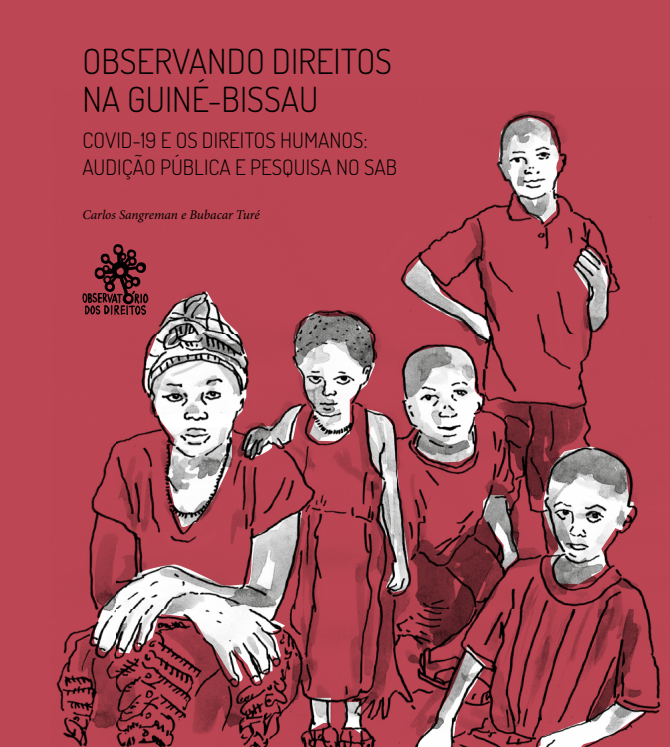
Observando direitos na Guiné-Bissau: Covid-19 e os direitos humanos: audição pública e pesquisa no SAB
Abstract:
Observando Direitos na Guiné-Bissau – Covid-19 e os Direitos Humanos: audição pública e pesquisa no SAB intends to investigate the human rights situation during the Covid-19 pandemic in Guiné-Bissau between January 2020 and January 2022. The framework is based on documentary research on human rights in sub-Saharan Africa from the production of international and specialized organizations, and other non-governmental human rights defenders of the same period. For Guiné-Bissau, in addition to equal research, the communiqués and official bulletins of the “Hight commissariat for Covid-19” were also collected with the information of infected, hospitalized, recovered, deaths and vaccinations, as well as interviews with the newspapers of the Commissioner and the Secretary. With the concentration of cases in the capital, Bissau, the research organize a survey of families, of market sellers and of companies on the effects of the pandemic and the measures enacted by the Government/Presidency to contain. A public hearing was also organized in the House of Rights, with various entities ranging from the High Commissariat to Unions, journalists, and public order police to information about how each institution through its situation and action in this period. As conclusions of the analyses of all these qualitative and quantitative data, it is possible to affirm that Guinea-Bissau’s fragility has such a weight in Guinean society that a disease that has killed fewer people in the country than malaria, diarrhea or tuberculosis has not overlapped with problems arising in poverty and low incomes in general. It affected Human Rights by showing that it was already knew about the enormous shortcomings of the health system, but the effects were more graves on economic and social rights by the abrupt stagnation of economic international activity, the cooperation project, unemployment, and the rise of poverty than directly by the pandemic and measures adopted. The human rights of first generation, more political, freedom of the press and demonstration were affected, with arbitrary arrests and violence practiced by unidentified individuals intensifying the climate of impunity and feeling that the regime is becoming increasingly repressive, but it cannot be said that they were effects directly arising from the pandemic.
Quotation:
Sangreman, C., Turé, B. (2022). Observando Direitos na Guiné-Bissau – Covid-19 e os Direitos Humanos: audição pública e pesquisa no SAB. pag.93. Lisboa: ACEP, com LGDH e CEsA. ISBN 978-9898625-27-4





